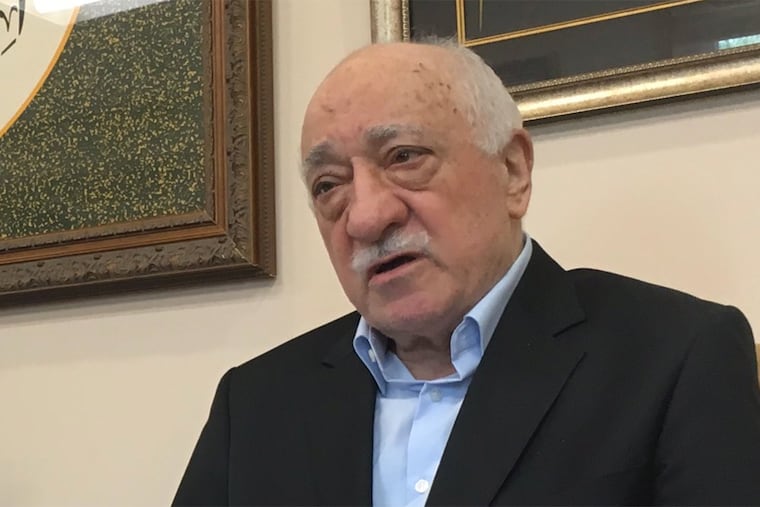Who is Fethullah Gülen, the Turkish cleric exiled in the Poconos at the center of charges against associates of Michael Flynn?
Gulen has lived in Pennsylvania for nearly 20 years, but Turkey blames him for an attempted coup in 2016 and allegedly hired Flynn and his associates to get him returned to face trial.

On Monday, two men involved in a lobbying campaign led by former National Security Adviser Michael Flynn were charged with conspiring to “covertly and unlawfully” influence U.S. politicians in an effort to get Fethullah Gülen, an Islamic cleric and businessman living in the Poconos, extradited to Turkey.
But who is Gülen and why does Turkey want him?
To put it simply, bad blood.
A coup and demands for extradition
Turkish President Recep Tayyip Erdogan has accused Gülen of directing a failed coup in 2016 and other efforts to destabilize his regime. Erdogan has repeatedly demanded the return of Gülen to face trial.
Gülen, who is said to be either 77 or 79, has denied the allegations.
But the two men were once close, sharing a common desire to turn Turkey from the secular state that emerged after World War I to one that is nationalist, conservative, and religious, something Erdogan has mostly succeeded in doing since beginning his rise to power in 2003.
Ariel Salzmann, an associate professor of Islamic and world history at Queen’s University in Canada, has said their relationship started to come apart when followers of Gülen, known as Gülenists, in the police and judiciary “became a little too independent” under Erdogan’s government.
Salzmann told Middle East Eye that the situation only got worse when Gülen criticized Erdogan for his handling of anti-government protests that turned violent in 2013.
After that, Erdogan went after Gülenist schools and moved to purge its members from from the courts, government, and military.
While this was underway, the police launched raids against businessman and Erdogan allies alleging they had bypassed international sanctions against Iran by sending gold to Tehran to buy oil and gas.
Erdogan’s supporters blamed Gülenists within the police for carrying out the raids.
Then, on July 15, 2016, a faction within the Turkish military moved to take control of the capital Ankara and Istanbul, only to be crushed by forces loyal to the government, leaving several hundred people dead and many more wounded.
Mass arrests and purges within the government followed as Erdogan blamed Gülen for the coup attempt and demanded his extradition from the United States.
Last month, a Turkish prosecutor also charged Gülen in the assassination of the Russian ambassador to Turkey in 2016.
Gülen, in the meantime, had been out of the country since 1999.
Exile in Pennsylvania
He first he came to the United States for medical treatment — he has heart problems and diabetes — and went into self-imposed exile in Saylorsville, Pa., after he was charged in 2000 with seeking the overthrow of Turkey’s then secularist government.
Gülen teaches a philosophy based in Islamic mysticism mixed with advocacy for education and democracy. He has attracted a multitude of followers who run universities, hospitals, and a large media empire in Turkey and, in the United States, a loosely affiliated network of professional associations and charities in addition to charter schools funded by millions of taxpayer dollars, including some in Pennsylvania and New Jersey. One of those schools was the now-closed Truebright Science Academy in Philadelphia’s Olney section.
The Flynn connection
Against this backdrop of suspicion and ill will, Flynn and his associates — Bijan Kian, and Turkish businessman, Ekim Alptekin — began working for Turkey behind the scenes and allegedly without registering as agents of a foreign government,
Federal agents began investigating Flynn in 2016, right after President Trump’s election, for possible violations of lobbying law, after he wrote an op-ed for The Hill newspaper attacking Gülen as a “radical Islamist” and a “shady Islamic mullah.”
Trump subsequently named Flynn his national security adviser, but Flynn resigned after 24 days when it became known that he had misled the FBI and Vice President Mike Pence about his communications with Russian Ambassador to the U.S. Sergey Kislyak during the presidential election campaign.
The Turkey lobbying investigation was then turned over to Special Prosecutor Robert Muller as part of his wider examination of Russian interference in the election.
While the Mueller investigation was underway, prosecutors also looked into reports that Flynn had discussed kidnapping Gülen and forcibly returning him to Turkey.
Flynn’s lawyer has denied that and the retired general has not been charged in that regard.
Flynn was scheduled to be sentenced Tuesday only for his guilty plea to lying to the FBI about his Russian contacts, but the proceedings were halted mid-hearing and delayed until at least March.